[PRESS RELEASE] Winners of WeGO Smart City Champions 2022: Who are this season’s Youth leaders?
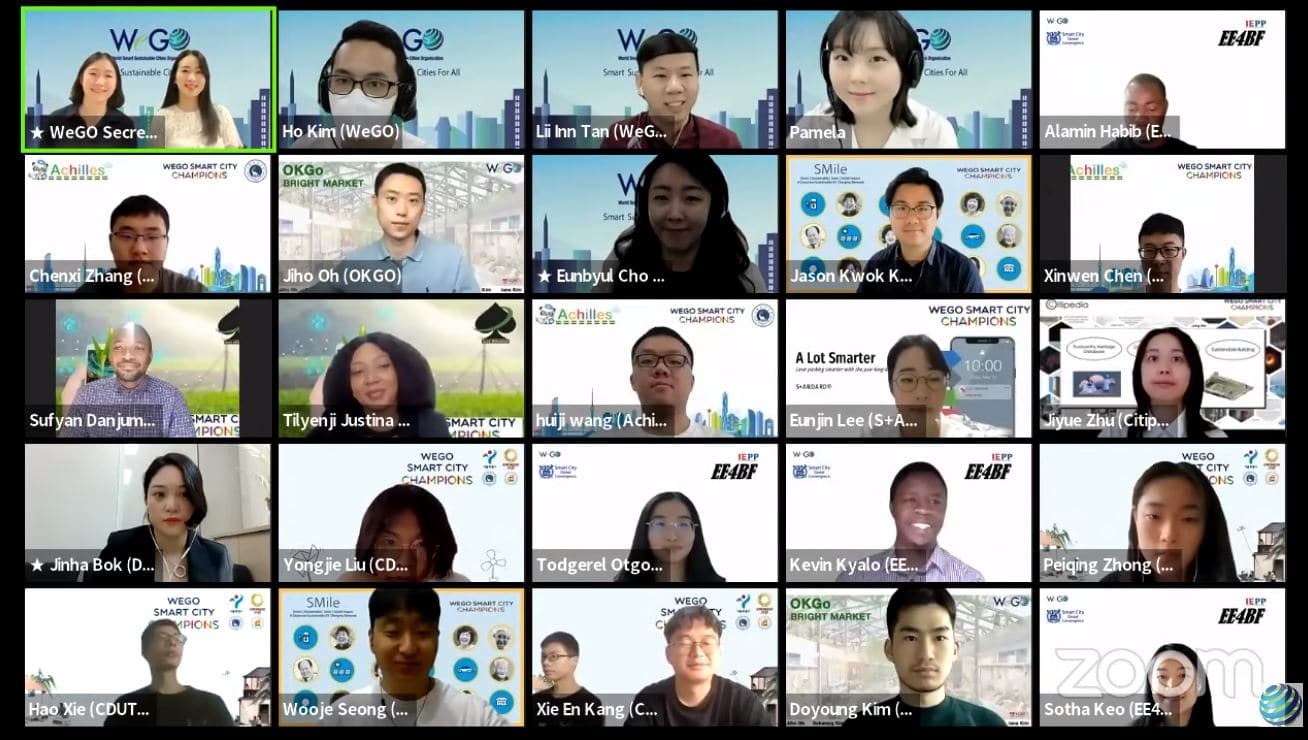
WeGO held the Finals of the WeGO Smart City Champions 2022 program, where the 11 finalist teams gathered together to discuss their ideas of effective solutions for building sustainable smart cities with renowned experts. Out of them, 3 teams have been selected as Champions on June 17, 2022.
June 22, 2022
SEOUL – The winners of the WeGO Smart City Champions 2022 were selected on the 17th of June, 2022. The winners are Aced Millennials, S:MILE, MECA, and Citipedia, with particular recognition. With this announcement, the WeGO Smart City Champions program, which started with over 500 students from 100 schools in 19 different countries, closed the door for this year’s edition – of course, successfully.
They were awarded the WeGO President Award signed by the Mayor of Seoul, a certificate signed by WeGO, and prize money. As for prize money, a total of 6,000,000 won (South Korean currency) will be delivered to them. Yet, there are still more events waiting for them this year: Seoul Leaders Forum, organized by the Seoul Metropolitan Government, and WeGO’s Year-end Ceremony 2022.
The above-mentioned winners were the most outstanding teams among the 11 finalists. They presented not only innovative ideas for urban challenges but also delivered their ideas clearly and interacted with other participants throughout the WeGO Smart City Champions Program. The main criteria for project proposal evaluation were the degree of creativity of the proposal, the potential for innovation that it will bring to the formation of sustainable smart cities, and the project’s ability to materialize. Each of the winners excelled on those key points.
Finals: Time for dialogues to deeper understand the participants’ ideas
Conducted on the 10th of June, 2022, the Finals secured an ice-breaking session with WeGO Staffs, where an exciting conversation sparked among participants to highlight the distinguishing features of their solutions. This was followed up by a round of in-depth dialogue with the judges, where students had a moment not only to exchange opinions around their proposals but also to clarify some critical questions and possible challenges that the experts had about their projects.
Every question placed on the discussion table allowed a deeper exploration of the young leaders’ thoughts: Who are the key partner organizations that one’s team would identify to meet the objectives of the project? What would be some of the foreseeable challenges that one’s team may face, if the project is implemented? What distinguishes one`s proposal from other solutions that provide similar benefits? These were one of the many questions raised during the conversations.
The students were dedicated to clarifying their projects – projects that turned out to be quite interesting and innovative. And, as is expected of a true Champion, they showed to have their values and objectives very well defined.
Zheng Chen | University of Hong Kong
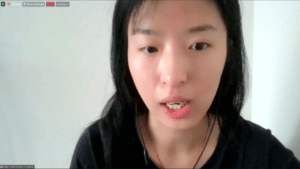
How will it be to have a museum for deceased people? Will it change the funeral culture for the better? These are the basic questions that made the team develop Citipedia. Zheng Chen, the team’s representative, expressed the aim to “make use of the metaverse environment for a newly developed world”, which was named Citipedia by the team. Chen added that this “newly developed world” could make a big difference in psychotherapy. The team connected the lines between technology and psychology for changes in the culture of death.
Sera Yun | Seoul National University
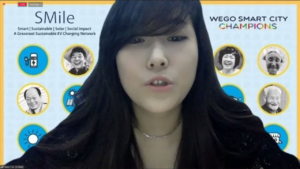 Sera Yun, from team S:MILE, took part in the discussion and expressed how confident the team is in their project’s idea, which involves the launch of an application to support the electric vehicles’ (EVs’) charging network. Sera Yun clarified: “We compete in terms of our unique and smart application and reconfiguration of smart technologies [regarding the EV charging network] in a way that is more efficient, functional, and viable. In that sense, we’d like to leverage that with our PPP model [the expected outcomes are] a lot more impactful in comparison to other competitors.” However, she expressed that their interest is not in the act of competing with others, and what they seek is “a complementary and mutually beneficial relationship where [the project’s] initiative and the existing infrastructure and the existing competitors can actually co-prosper.”
Sera Yun, from team S:MILE, took part in the discussion and expressed how confident the team is in their project’s idea, which involves the launch of an application to support the electric vehicles’ (EVs’) charging network. Sera Yun clarified: “We compete in terms of our unique and smart application and reconfiguration of smart technologies [regarding the EV charging network] in a way that is more efficient, functional, and viable. In that sense, we’d like to leverage that with our PPP model [the expected outcomes are] a lot more impactful in comparison to other competitors.” However, she expressed that their interest is not in the act of competing with others, and what they seek is “a complementary and mutually beneficial relationship where [the project’s] initiative and the existing infrastructure and the existing competitors can actually co-prosper.”
Tilyenji Justina Mwanza | University of Seoul
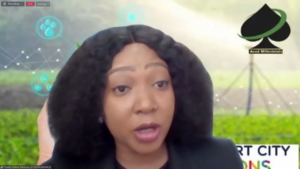 Tilyenji joined the conversation representing her group, Aced Millennials, made up of students from different universities and faculties. The team’s main proposal was to promote smart agro-tourism by fashioning an optimum cultivation environment to enhance productivity and quality of agricultural goods with less use of labour, energy and fertilization than before, and form new combined tourism products that contribute to the sustainable development of less developed areas. To achieve this goal, Tilyenji explained that her team thought of several potential entities working together, such as the local community and municipalities. In addition, she mentioned that the project would also need partners with potential for funding, as the cost of implementation has to be considered. She added that funding would be possible through “public-private partnership, [or] even from international funding organizations. For example, Dohwa Engineering, World Bank, and the European Union.” Thus, with her comments, she showed how the team had a realistic focus to actually put the ideas into practice.
Tilyenji joined the conversation representing her group, Aced Millennials, made up of students from different universities and faculties. The team’s main proposal was to promote smart agro-tourism by fashioning an optimum cultivation environment to enhance productivity and quality of agricultural goods with less use of labour, energy and fertilization than before, and form new combined tourism products that contribute to the sustainable development of less developed areas. To achieve this goal, Tilyenji explained that her team thought of several potential entities working together, such as the local community and municipalities. In addition, she mentioned that the project would also need partners with potential for funding, as the cost of implementation has to be considered. She added that funding would be possible through “public-private partnership, [or] even from international funding organizations. For example, Dohwa Engineering, World Bank, and the European Union.” Thus, with her comments, she showed how the team had a realistic focus to actually put the ideas into practice.
Yeokyung Hwang | Seoul National University
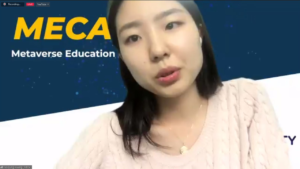 Yeokyung Hwang began her speech by recalling that the proposal of her team, MECA, was to use the metaverse technology to provide experience-based learning as a solution to the lack of experiential learning since physical and geographical constraints related to accessibility will continuously be an issue. Culture and art education could also be carried out with technology for immersion. The team conceived the immersion in a game format and game engine, in which the user would have an interactive experience through VR devices, in parallel with cost reduction solutions using appropriate technologies such as LIDAR and photogrammetry.
Yeokyung Hwang began her speech by recalling that the proposal of her team, MECA, was to use the metaverse technology to provide experience-based learning as a solution to the lack of experiential learning since physical and geographical constraints related to accessibility will continuously be an issue. Culture and art education could also be carried out with technology for immersion. The team conceived the immersion in a game format and game engine, in which the user would have an interactive experience through VR devices, in parallel with cost reduction solutions using appropriate technologies such as LIDAR and photogrammetry.
Experts giving insights and further discussion on the topics
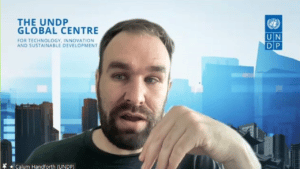 Calum Handforth | Digital Health and Smart Cities Advisor at UNDP Global Centre for Technology, Innovation and Sustainable Development (GC-TISD)
Calum Handforth | Digital Health and Smart Cities Advisor at UNDP Global Centre for Technology, Innovation and Sustainable Development (GC-TISD)
Calum Handforth gave his opinions considering the values prioritized by the teams when developing their ideas and the mission behind the projects.
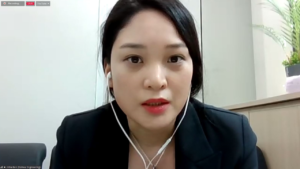 Jinha Bok | Bidding Manager of the Global Division at DOHWA Engineering Company
Jinha Bok | Bidding Manager of the Global Division at DOHWA Engineering Company
Jinha Bok measured, above all, the realistic side of the projects and focused on the ability of ideas to materialize to give material results.
The future that awaits the winners
There is a lot that can be said about the future of the winners just by observing how they proposed ideas from several possible fields of activity in the metaverse – such as education in culture and art, electric vehicles, agriculture and tourism, and psychology – and correlated them adequately on the big topic of smart sustainable cities. The winners managed to touch with great sensitivity and intelligence on the topics most necessary for their generations and for future generations. Undoubtedly, they are young people capable of offering the world what it needs to keep it sustainable.
Winners are certainly aware of how they can change the world with the metaverse, and it is from their awareness that WeGO relies so much on and that it will be accompanying the winners on their journey of planning concrete and tangible policies around their ideas.
The winners will have the chance to present their projects during the “Youth Session” of the Seoul Leaders Forum, organized by the Seoul Metropolitan Government, which will take place on September 27, 2022, between 3 to 5 p.m., at the Dongdaemun Design Plaza, in Seoul. In addition to participating in the Seoul Leaders’ Forum, finalists will be invited to other WeGO international events including WeGO’s Year-end Ceremony 2022, where they will have space to meet top-notch leaders and professionals in their field of interest.
About WeGO Smart City Champions
WeGO Smart City Champions is one of the main programs conducted by the World Smart Sustainable Cities Organization (WeGO). It consists of a 15-week youth program that aims to recruit youth in member cities from all around the world to gain knowledge and build consensus around the future of smart cities. For this purpose, more than a hundred young leaders gather together in teams and bring in and develop innovative ideas, of which only 3 are selected to be invested and further developed in connection to real actors from domestic and international backgrounds, who can turn these ideas into reality.
To learn more about the WeGO Smart City Champions, visit our website here.
About WeGO
The World Smart Sustainable Cities Organization (WeGO), established by 50 founding members in 2010, is an international association of city and other local governments, smart tech solution providers, and national and regional institutions committed to the transformation of cities into smart sustainable cities WeGO’s Secretariat is based in Seoul and supported by regional offices in Africa (Abuja, Nigeria), East Asia (Chengdu, China), Eurasia (Ulyanovsk Region, Russia), the Mediterranean (Beyoğlu, Turkey), and Latin America (Mexico City, Mexico).
WeGO has more than 200 members around the world and serves as their international platform to improve the quality of life, innovate in the delivery of public services, and strengthen regional competitiveness.
Media Contact:
Name: Pamela Paik
E-mail: pamela@we-gov.org
Phone: 02-720-2931

